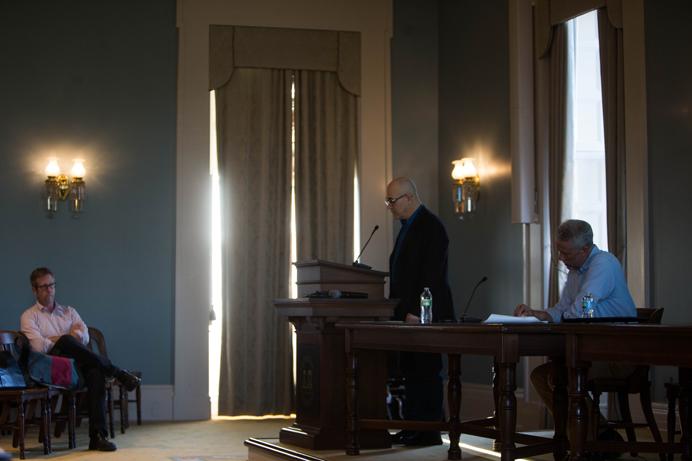By Isabella Senno
Community members were encouraged to take a macro perspective when reflecting on recent debates concerning immigration status and Islamophobia at an event Monday called “Protecting the Nation?: (Im)migration and Identity in the Contemporary U.S.”The event was split into a lecture by University of Northern Illinois Professor Mehdi Semati and a round-table discussion by University of Iowa faculty and a local expert on Islamic-American relations.
The evening’s hot-button topic was the series of executive orders that President Trump has attempted to implement since he took office in January.
Thomas Oates, event co-organizer and UI assistant professor of American studies, said a vast amount of media coverage on the executive orders has been too focused on immediate events, and people would be better educated though a global approach.
“[Looking at] where these politics came from … is a much longer historical question and one that media commentators are not generally very well-equipped to address,” Oates said. “… It’s not the case that this is specifically an American approach to these issues, so in order to understand what’s happening at this moment politically, I think it’s important not just to talk about the United States, but also what’s happening in democratic states in Europe as well.”
The event was designed to provide this larger context and made a point to integrate the larger history of immigration and its connections with race and religion in the United States as well as abroad. Semati’s lecture set the tone for the evening, leading the room through the growth of the far-right movement across Europe and its visible effect on the United States.
Semati said the actions of the individual were used to stereotype the group, and the assumptions about the group identity complicated life for the individual member.
This allowed the conversation to flow toward the roots of anti-immigrant sentiment on American soil, a thread picked up by panelist Bluford Adams, a UI associate professor of English and American Studies.
“There’s plenty of precedence for religious bigotry driving nativism sentiment and nativist laws, there’s no doubt about that,” Adams said. “We really don’t have that many Muslim immigrants in this country … it’s been more driven, it seems to me, by hysteria over what’s perceived as radical Islamic terrorism. It’s not about numbers, it’s about fear.”
Although discussion centered on broad topics, Miriam Amer, a panelist and the executive director of the Iowa chapter of the Council on Islamic-American Relations, made sure the discussion remained grounded in recognizing humanity and extending respect.
“We’re not new; Muslims came to this nation before it was a nation in the holds of the slave ships, they came with Columbus,” Amer said. “There are Muslims in every branch of the federal government, there are Muslims here in Iowa who have been here since the 1850s — they came hauling their carts across the prairies. They are doctors and lawyers and business people, they’re in every aspect of our society. We are a part of the fabric of this nation, and we’re not going anywhere.”







